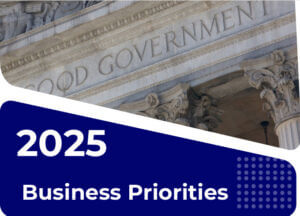2025 Business Priorities - Working to create an environment where businesses and families thrive.
We pride ourselves as a strong coalition of business leaders, entrepreneurs and community members who work together to create an environment where businesses want to build and expand, and families want to put down roots. It is imperative that we work to enact policies at all levels that encourage and allow Minnesota families and businesses to grow and expand throughout the Elk River area and the surrounding communities.
HOUSING
Housing is vital for economic development, addressing workforce needs, and fostering diverse options like senior and workforce housing to support retention, growth, and community success.
Housing is a critical factor in economic development and essential to addressing workforce needs for the region. Supporting the study of housing needs helps inform decision making and fosters beneficial outcomes, such as providing diverse housing options that contribute to workforce retention and community growth. Addressing life-stage housing, including senior housing, strengthens the regional economy and creates opportunities for first-time homebuyers and workforce housing, positioning the community for long-term success.
CHILDCARE
Affordable, high-quality childcare is key to workforce participation and economic growth, supporting thriving families and reliable, productive businesses through expanded access and advocacy.
Access to affordable and high-quality childcare is essential for workforce participation and economic prosperity. The Chamber remains committed to advocating for resources and policies that expand childcare availability and affordability, ensuring families in our community can thrive while businesses benefit from a reliable and productive workforce.
INFRASTRUCTURE PLANNING
Proper infrastructure planning sustains growth and well-being. Collaborative forums ensure informed input, enabling effective execution of projects like roads, utilities, and public facilities for long-term community needs.
Proper planning for urban and county infrastructure projects is essential to sustaining economic growth and community well-being. The Chamber supports a collaborative approach that includes informed input from businesses and residents through forums and discussions. Engaging stakeholders ensures large-scale projects, such as road improvements, utility expansions, and public facilities, are executed effectively and serve the long-term needs of the community.
ENERGY
We support renewable energy initiatives, as well as energy conservation and efficiency programs.
We support renewable energy initiatives, as well as energy conservation and efficiency programs. The transition and growth at the Sherco site present significant opportunities for innovation and investment in energy initiatives. Leveraging this site for renewable energy projects and other advancements aligns with future energy demands. Emphasis is placed on voluntary compliance measures and appropriate market-based incentives to lower costs while encouraging sustainable practices. Maintaining a stable power grid and preserving zoning for industrial and commercial purposes are vital to sustaining the tax base and fostering regional economic development.
GOOD GOVERNANCE
Promote accountability and transparency by addressing government fraud, ensuring fair workplace mandate implementation, allowing flexibility in paid leave programs, and reducing burdensome state-imposed costs on employers to support a strong and sustainable economy.
FISCAL RESPONSIBIILITY
The Legislature must enact a balanced, sustainable budget, avoid new taxes or workplace mandates, and address projected revenue shortfalls to support Minnesota businesses.
ECONOMIC COMPETITIVENESS
Taxes - Support a pro-growth tax system enhancing competitiveness, innovation, and job growth. Prioritize R&D tax credits and immediate conformity with federal tax provisions to boost investment.
Workforce - Develop and retain a skilled workforce aligned with economic needs. Require state aid recipients to remain in Minnesota post-graduation, ensuring taxpayer investment benefits the state.
Bipartisan solutions to reduce costs - Promote bipartisan solutions: reform environmental permitting, fund reinsurance to stabilize insurance markets, and lift the nuclear energy ban for reliable, affordable carbon-free electricity by 2040.

